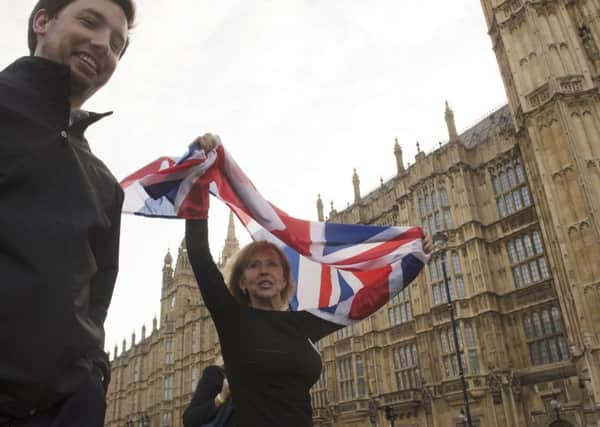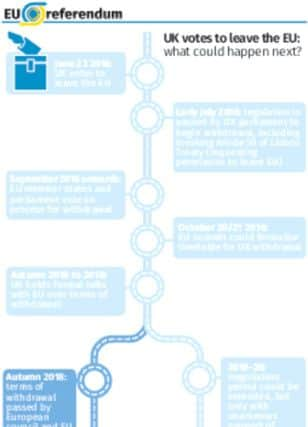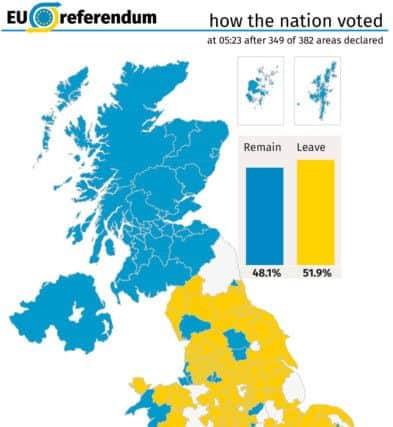Referendum: Leave campaign get their wish... but what happens next?


Simon Walker, Director General of the Institute of Directors, said: “While this may not have been the result that the majority of our members wanted, Britain has voted to leave the EU, and it is now imperative that our political leaders manage the transition as smoothly as possible. The weeks and months ahead are going to be a nervy time for business leaders, so they need to know that the Government is focused on maintaining stability while a new relationship with the EU is established.
Advertisement
Hide AdAdvertisement
Hide Ad

“It is now beholden on politicians to negotiate a deal with European leaders which preserves the ability of British firms to trade easily with the remaining member states.
Advertisement
Hide AdAdvertisement
Hide Ad“Even once we have left, the EU will continue to be our biggest trading partner, and the first destination for many companies when they start to export.


“One thing the Government must do immediately is to guarantee the right to remain of EU citizens currently in the UK. Companies do not want to have to worry about losing valued staff.”
Dr Adam Marshall, acting director general of the British Chambers of Commerce, said: “In the wake of the electorate’s historic decision to leave the European Union, the immediate priorities for UK business are market stability and political clarity.
“Some businesspeople will be pleased with the result, and others resigned to it. Yet all companies will expect swift, decisive, and coordinated action from the government and the Bank of England to stabilise markets if trading conditions or the availability of capital change dramatically.
Advertisement
Hide AdAdvertisement
Hide Ad“Firms across the UK want an immediate and unambiguous statement from the Prime Minister on next steps, along with a clear timeline for the UK’s exit from the European Union.


“Business will also want to see a detailed plan to support the economy during the coming transition period - as confidence, investment, hiring and growth would all be deeply affected by a prolonged period of uncertainty.
“If ever there were a time to ditch the straight-jacket of fiscal rules for investment in a better business infrastructure, this is it.”
Carolyn Fairbairn, the CBI’s director general, said many businesses will be concerned and need time to assess the implications.
Advertisement
Hide AdAdvertisement
Hide Ad“But they are used to dealing with challenge and change and we should be confident they will adapt.


“The urgent priority now is to reassure the markets. We need strong and calm leadership from the Government, working with the Bank of England, to shore up confidence and stability in the economy.
“The choices we make over the coming months will affect generations to come. This is not a time for rushed decisions.
“The CBI will be consulting its members and business is committed to working with Government to shape the best possible conditions for future prosperity.”
Advertisement
Hide AdAdvertisement
Hide AdMike Cherry, chairman of the Federation of Small Businesses (FSB), said: “Smaller businesses up and down the country now need a focus on economic certainty and stability.
“In light of the result this morning there has been a shock to the market with the pound falling to its lowest level against the dollar since September 1985. Today we call on the Government and the Bank of England to urgently put in place measures to prevent any further instability negatively impacting small businesses in the UK.
“Small firms need to know what this means for access to the single market as soon as possible.”
What happens next now that Britain has opted for divorce with Brussels?
Advertisement
Hide AdAdvertisement
Hide Ad• Prime Minister David Cameron will make a statement. He want to reassure the country and the financial markets about the prospects of a smooth transition. He may also address the implications for his own position of having failed to take the country with him. Boris Johnson, Michael Gove and other pro-Brexit Tories have publicly backed him staying in Number 10 to oversee negotiations but many Westminster observers believe his position will be untenable.
• Trading on the London Stock Exchange could be suspended. Chancellor George Osborne has discussed the radical step with Bank of England Governor Mark Carney in the event that Brexit triggers a “Black Friday” crash. The pound overnight dropped to its lowest level in more than 30 years at the prospect of the UK quitting the bloc. Shadow chancellor John McDonnell has said he expects the Bank of England to intervene given the scale of the turbulence.
• An emergency EU summit? Leaders are scheduled to gather on Tuesday but the meeting could be brought forward to deal with the fallout of the dramatic change, which could have huge ramifications for the future of the entire project. A press conference is due to take place later this morning with the heads of the European Commission, Council and Parliament - and Mark Rutte, prime minister of the Netherlands which holds the rotating presidency.
• Negotiations over the terms of the UK’s exit. Article 50 of the 2007 Lisbon Treaty envisages a two-year negotiation to draw up a withdrawal agreement. If no deal is reached - and any of the other 27 states block an extension of talks - the EU treaties simply cease to apply to the state in question at the end of the period, leaving it to operate under international rules set by bodies such as the World Trade Organisation (WTO). Mr Cameron has previously said that he would kick off the withdrawal process immediately but Brexiteers say the process does not have to begin straight away - or indeed at all. Tory minister and leading Leave campaigner Andrea Leadsom said Britain could negotiate a bilateral agreement with a “presumption of continuity” of free trade.
Advertisement
Hide AdAdvertisement
Hide Ad• A Government reshuffle? Assuming he stays on as Prime Minister, Mr Cameron will be under enormous pressure to promote senior Leave figureheads such as Boris Johnson to key positions in a new-look ministerial team. Chancellor George Osborne is seen as particularly vulnerable to the axe after angering Conservatives with stark warnings about the impact of leaving on the economy which they condemned as “scaremongering”.
• Another independence referendum in Scotland? Every area north of the border voted in favour of remaining in the EU, prompting former SNP leader Alex Salmond to state it was “almost certain” that the country would be asked to reconsider its place in the United Kingdom. Voters rejected a breakaway in 2014 but in the manifesto on which it won a fresh term in power at Holyrood last month, the party left open the option of reopening the question in the event of a “significant and material” change in circumstances such as being forced out of the EU against the will of a majority of its people.
Read more...